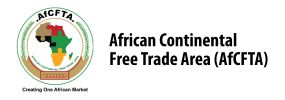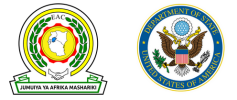Posted in Trade
The EAC Partner States have signed the following Trade Agreements:
The African Continental Free Trade Area, (AfCFTA) was established in 2018 as one of the flagship projects of the African Union Agenda 2063 with the main mandate to create a single continental market of 55 Member States of the African Union.
Read more
The Tripartite is an umbrella organisation consisting of 3 of Africa’s Regional Economic Communities, namely: the Common Market for Eastern and Southern Africa; the East Africa Community and the Southern African Development Community. The Tripartite consists of 26 member countries.
Read more
Trade and Investment Framework Agreement between the East African Community (EAC) and the Government of the United States of America aimed at promoting an attractive climate and to expand and divesify trade in prodcuts and services between the EAC and the United States.
Read more
A cooperation agreement between the EAC Partner States and the United States of America, to improve
cooperation on trade facilitation, sanitary and phytosanitary measures, and technical barriers to
trade.
Read more
A Letter of Intent establishing the EAC-U.S. Commercial Dialogue was signed by both Parties on 19th October 2013. The Letter of Intent provides the principles and objectives that will guide the Parties’ cooperation in the Commercial Dialogue.
Read more
Posted in Trade
The African Continental Free Trade Area (AfCFTA) is one of the flagship projects of the African Union (AU) Agenda 2063: The Africa We Want.
It is a high ambition trade agreement, with a comprehensive scope that includes critical areas of Africa’s economy, such as digital trade and investment protection, amongst other areas. By eliminating barriers to trade in Africa, the objective of the AfCFTA is to significantly boost intra-Africa trade, particularly trade in value-added production and trade across all sectors of Africa’s economy.
Key Provisions of the Agreement:
The AfCFTA is the world’s largest free trade area bringing together the 55 countries of the African Union (AU) and eight (8) Regional Economic Communities (RECs) to create a single market for the continent. The aim is to enable the free flow of goods and services across the continent and boost the trading position of Africa in the global market.
As part of its mandate, the AfCFTA is to eliminate trade barriers and boost intra-Africa trade. In particular, it is to advance trade in value-added production across all service sectors of the African Economy. The AfCFTA will contribute to establishing regional value chains in Africa, enabling investment and job creation. The practical implementation of the AfCFTA has the potential to foster industrialisation, job creation, and investment, thus enhancing the competitiveness of Africa in the medium to long term.
The AfCFTA entered into force on May 30, 2019, after 24 Member States deposited their Instruments of Ratification following a series of continuous continental engagements spanning since 2012. It was launched at the 12th Extraordinary Session of the AU Assembly of Heads of State and Government in Niamey – Niger, in July 2019. The commencement of trading under the AfCFTA was in January 1, 2021.
Current Status:
- ratified by Republic of Burundi, Democratic Republic of Congo, Republic of Kenya, Republic of Rwanda, Republic of Uganda, and the United Republic of Tanzania.
- signed by the Republic of South Sudan and the ratification process is underway.



